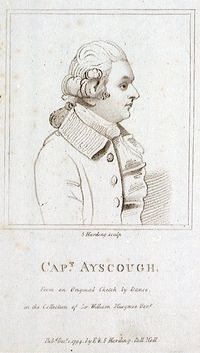George Edward Askew on:
[Wikipedia]
[Google]
[Amazon]
 George Edward Ayscough (died 14 October 1779) was an English dramatist and traveller.
George Edward Ayscough (died 14 October 1779) was an English dramatist and traveller.
 George Edward Ayscough (died 14 October 1779) was an English dramatist and traveller.
George Edward Ayscough (died 14 October 1779) was an English dramatist and traveller.
Life
Ayscough was the son of Dr.Francis Ayscough
Francis Ayscough (1701–1763) was a tutor to George III and Clerk of the Closet to his father Frederick, Prince of Wales
, dean of Bristol
The Dean of Bristol is the head of the Chapter of the Cathedral Church of the Holy and Undivided Trinity, Bristol, England. The Dean is Mandy Ford, since her installation on 3 October 2020.
List of deans
Early modern
*1542–1551 William Sno ...
, by a sister of the first Lord Lyttelton. For some time he held a commission in the Guards.
In 1776, he produced at Drury Lane Theatre
The Theatre Royal, Drury Lane, commonly known as Drury Lane, is a West End theatre and Grade I listed building in Covent Garden, London, England. The building faces Catherine Street (earlier named Bridges or Brydges Street) and backs onto Drur ...
a play, a version of the ''Semiramis'' of Voltaire
François-Marie Arouet (; 21 November 169430 May 1778) was a French Age of Enlightenment, Enlightenment writer, historian, and philosopher. Known by his ''Pen name, nom de plume'' M. de Voltaire (; also ; ), he was famous for his wit, and his ...
, Richard Yates representing the chief character; an epilogue was provided by Richard Brinsley Sheridan
Richard Brinsley Butler Sheridan (30 October 17517 July 1816) was an Irish satirist, a politician, a playwright, poet, and long-term owner of the London Theatre Royal, Drury Lane. He is known for his plays such as ''The Rivals'', ''The Sc ...
. The tragedy had eleven representations, and the English author enjoyed three benefits on account of it. On the first performance Captain Ayscough's brother officers attended in great force and secured the success of ''Semiramis''. In the ''Biographia Dramatica
Isaac Reed (1 January 1742 – 5 January 1807) was an English Shakespearean editor.
Biography
The son of a baker, he was born in London. He was articled to a solicitor, and eventually set up as a conveyancer at Staple Inn, where he had a large p ...
'', Ayscough is described as "a fool of fashion," "a parasite of Lord Lyttelton;" and his tragedy is condemned as contemptible.
He left England on account of his failing health, and afterwards published some account of his travels in Italy. He was the editor of the ''Miscellaneous Works'' of his uncle, Lord Lyttelton, published in 1774.
References
Year of birth missing 1779 deaths English dramatists and playwrights English travel writers 18th-century English non-fiction writers 18th-century English male writers 18th-century English writers English editors 18th-century British dramatists and playwrights English male dramatists and playwrights {{England-writer-stub